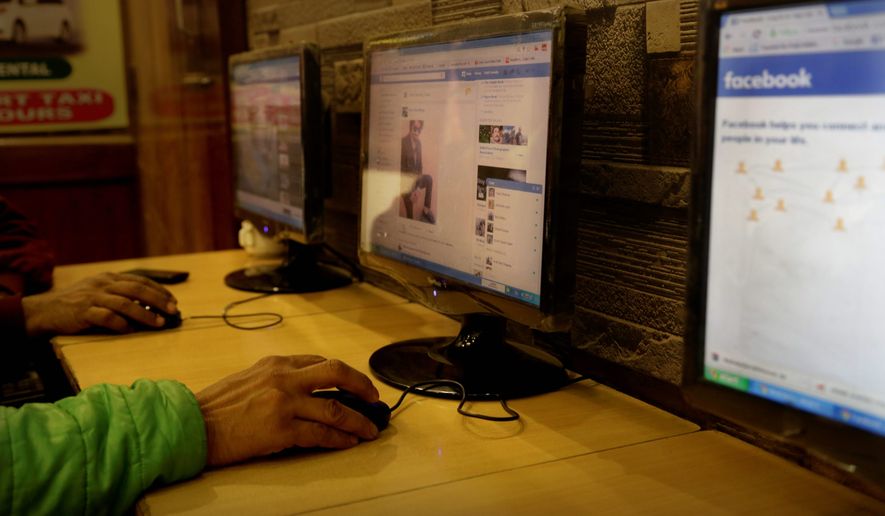Liberal comedian John Oliver and Facebook’s Mark Zuckerberg received a boost this week in their fight to keep net neutrality as thousands of comments poured in to the Federal Communications Commission — from Russia.
Many of the Russian posts filed on the FCC website were substantially alike and overwhelmingly in favor of retaining the Obama-era internet regulations, indicating that the impassioned net neutrality campaign backed by liberal billionaire George Soros has managed to spill overseas.
“The Open Internet rules (net neutrality) are extremely important to me,” Kondrat Yevdokimov of Cheylabinsk Oblast, Russia, said in a Wednesday comment.
“Don’t allow the Trump administration [to] control the media streaming and then make only his NEWS,” he added.
The Russian connection comes with the public comment process already under scrutiny after several analyses turned up hundreds of thousands of posts from fake email addresses — or real people whose identities were stolen — advocating on both sides of the issue.
Peter Flaherty, president of the National Legal and Policy Center, a right-leaning watchdog group, called the deluge of fake and foreign comments hitting the FCC docket amazing.
“Orchestrated campaigns are nothing new. It’s part of the public comment process,” Mr. Flaherty said. “But this is unprecedented. I can’t think of another instance where messages rolled in like this from overseas.”
Then again, the net neutrality debate has reached a fever pitch, drawing 7.4 million comments since FCC Chairman Ajit Pai announced the proposed Restoring Internet Freedom rule on May 18.
The rule-making would roll back the FCC’s 2015 Title II policy, known as the Open Internet Order, which classified and regulated high-speed internet as a public utility, giving the federal government greater authority over internet service providers such as Verizon and Comcast.
Fighting to keep the Obama-era rule in place is a broad progressive coalition that includes the American Civil Liberties Union, Center for Media Justice, Color of Change, Common Cause, Daily Kos, Demand Progress, Greenpeace, Open Society Foundations and the Women’s March, as well as tech giants such as Google, Amazon, Facebook and Twitter.
Public interest surged after Mr. Oliver urged viewers in a May 7 monologue on “Last Week Tonight” to post comments in favor of saving net neutrality and cited his website, gofccyourself.com.
Evan Greer, campaign director for the pro-regulation Fight for the Future, said the Russian activity might have come in response to the publicity, pointing to Wednesday’s high-profile Day of Action for Net Neutrality.
More than 125,000 websites, internet surfers and organizations participated by championing net neutrality in online posts and warning of slower, more-expensive service if the rule is repealed.
“The day of action was massive and was seen by people all over the world, so it’s not surprising that internet users in other countries felt compelled to comment as well,” Ms. Greer said. “FCC policies impact everyone that uses the internet.”
One popular line from the Russian comments says “fight For Our Future as if our life depend [sic] on it,” but Ms. Greer said Fight for the Future did not solicit the Russian participation.
She said the group’s comment form “requires a U.S. postcode so that we can deliver people’s emails to their respective lawmakers.”
“Our goal is to ensure that the voices of internet users are heard,” she added.
Fight for the Future called for the FCC to take action after the discovery of more than 450,000 fake posts against net neutrality, including some that had appropriated the identities of people without their permission.
The FCC declined to remove the phony filings. Mr. Pai explained that “what matters most are the quality of the comments, not the quantity.”
“We will make our decision based on the facts that are in the record and on the relevant law that is presented — and obviously fake comments such as the ones submitted last week by the Flash, Batman, Wonder Woman, Aquaman and Superman are not going to dramatically impact our deliberations on this issue,” Mr. Pai said in a May 30 statement to B&C.
Mr. Flaherty followed up with a May 31 analysis showing there are plenty of cheaters on both sides. His center found that 465,322 of all pro-net-neutrality posts, or about one-fifth at the time, “appear to have come from email addresses that have made multiple submissions, sometimes with duplicates in the thousands.”
He said the watchdog group is tallying the foreign posts, which also hail from France and Germany, with plans to release another accounting next week.
Rep. Frank Pallone Jr., New Jersey Democrat, has called for a Justice Department probe into the stolen identities, urging Attorney General Jeff Sessions in a June 28 letter to take “swift action to investigate who may be behind these comments.”
Comments on the proposed Restoring Internet Freedom rule-making are due July 17, with replies due Aug. 16.
Ultimately, the hoopla over bogus and foreign comments may be for naught. The commission has three members, and two of them — Mr. Pai and Michael O’Rielly — are expected to vote to reverse net neutrality.
Both Republicans voted against net neutrality in 2015 over concerns about bureaucratic red tape holding back broadband innovation and investment. The commission had five members at the time, and the policy passed on a 3-2 vote.
“Not only do we have a massive astroturf operation here, but it’s probably a lost cause,” Mr. Flaherty said. “It’s quite ironic.”
• Valerie Richardson can be reached at vrichardson@washingtontimes.com.




Please read our comment policy before commenting.